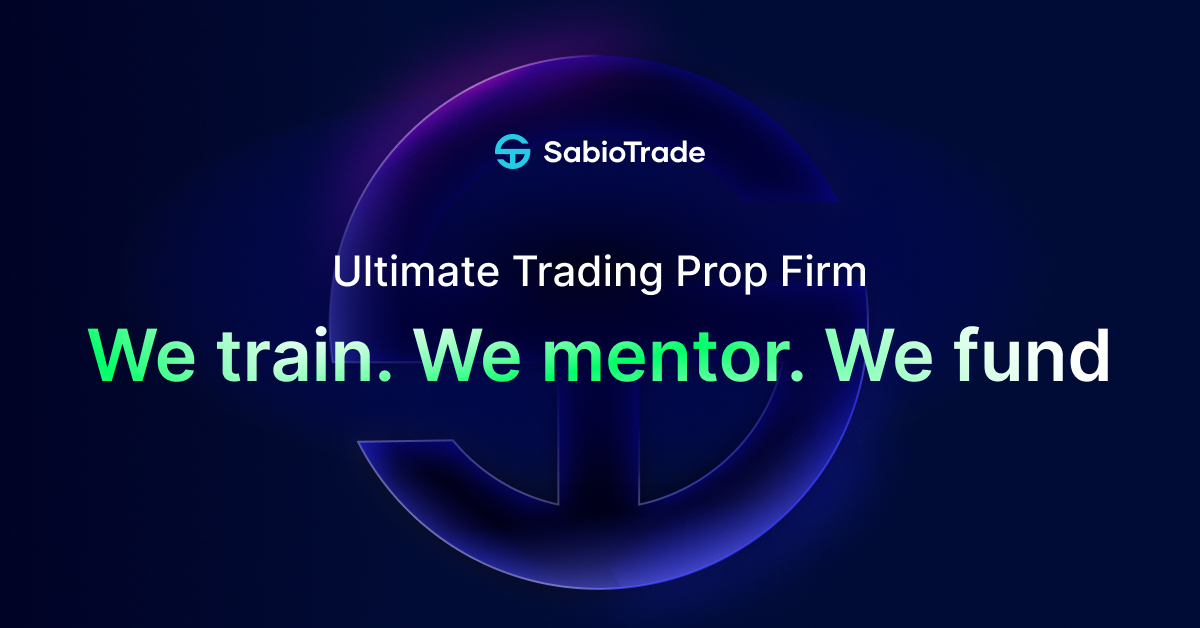Prop trading is a popular approach to forex and commodities trading that allows retail traders to access funded trading accounts in exchange for a fee and certain restrictions and rules.
The global prop trading market has been growing rapidly over the past 5 years and traders based in the Netherlands now have access to a wide range of prop trading companies from all over the world, including some of the top-rated ones with huge payouts and over $1 million in available funding levels.
However, due to the abundance of prop firms and saturation of the market, choosing the right prop trading company for you may be challenging, as hundreds of such firms offer different terms, features and perks to their prospective clients.
How prop trading works in principle
The core principles behind prop trading are quite simple – firms provide funded accounts to traders who would like to drastically increase their buying power in exchange for a fee.
Funded accounts can range from as low as $1,000 in funding, all the way up to $1 million and more.
Each of these accounts come with a set of rules traders need to follow in order to pass the evaluation stage(s) and gain access to the funds. Even after this, the rules and limits still need to be to maintain the account. Otherwise, the trader will need to start over and pay the fee again. In many cases, the fee is fully refundable once the trader successfully passes the funding challenge.
What to know about prop trading in the Netherlands
The prop trading market in the Netherlands is still relatively young and not many firms are registered in the country. However, local traders have access to some of the best firms from across Europe and the entire world.
Traders based in the country can access forex and CFD-s funded accounts, with some prop firms offering more than $1 million in maximum funding.
In many cases, prop firms will also provide multiple account currency options – allowing traders in the Netherlands to use the euro as their primary account currency.
It is also worth noting that the prop trading market is largely unregulated in the Netherlands – as it is in many countries globally, which means that traders need to be vigilant in order to identify the best possible options available on the market.
The best prop trading companies available to traders in the Netherlands
The Netherlands is home to dozens of successful prop trading companies and traders may find it a bit challenging to choose the best possible one.
Luckily, we have compiled a short list of some of the best prop trading firms available in the Netherlands that you can sign up with today and get funded to trade hundreds of instruments.
| Firm | Rating | Lowest Funding | Max Funding | Minimum Fee | Profit Split | Daily Drawdown | Max Drawdown |
|---|---|---|---|---|---|---|---|
| Instant Funding | 4.11 | $1,250 | $200,000 (scales up to $1.25 mln) | $79 | Up to 90% (scaling) | N/A | 10% |
| Blue Guardian | 3.95 | $10,000 | $200,000 | $87 | 85% | 4% | 8% |
| FundedTradingPlus | 4.05 | $5,000 | $250,000 (scales up to $2.5 mln) | $119 | Up to 80% | 3-4% | 5-8% |
| FTUK | 3.64 | $14,000 | $90,000 (scales up to $5 mln) | $149 | 80% | N/A | 8% |
| E8 Funding | 3.18 | $25,000 | $300,000 | 138 USD | 80% | 5% | 8% |
Why you should consider prop trading in the Netherlands
The Netherlands is one of the most important financial hubs in Europe and home to major financial institutions, as well as top-tier regulatory agencies and an overall business-friendly environment.
As we have already mentioned, the country is home to a wide variety of prop trading firms, but why would you consider signing up at a prop firm and completing a funding challenge?
There are a few important reasons why prop trading may be a good idea for your financial goals, which we will discuss in greater detail below.
Increased buying power
The main reason why traders choose prop trading companies is because they provide funded accounts that allow traders to increase their buying power drastically and generate substantial profits while risking only a portion of their own capital.
Most prop trading accounts range between $10,000 and $100,000 in funding, while some accounts may provide funding up to $1 million or above.
This gives traders the opportunity to not only access a lot of capital, but to also use leverage to further boost their buying power.
Leverage
Leverage is an integral part of the forex trading experience and prop trading companies are no different in this regard. Traders have access to forex leverage as high as 1:1000, which allows them to access large positions while risking much less of the funds allocated to them after completing the funding challenge.
However, it is also worth considering that leverage can be a double edged sword, as it also amplifies the potential losses experienced by the trader. Therefore, it is crucial to exercise caution when using leverage to trade on a funded account to avoid violating the drawdown rules.
Sophisticated software
Numerous prop trading companies are partnered with regulated brokerage firms, which allows them to have access to state of the art software, such as the MetaTrader 4 and MetaTrader 5 platforms.
These trading platforms come equipped with a wide range of technical indicators and other useful features to help you analyze and navigate the markets and make the most of trading opportunities as they arise on the market.
However, it is important to note that not every prop trading company will offer MetaTrader and cTrader and it is advisable to check this information with the prop firm before signing up for a funding challenge.
Instant funding
Some prop trading firms offer instant funding, which means that traders are not required to go through the hoops of completing multiple challenge steps in order to gain access to a funded account.
They simply pay the account fee and are able to use the funds for trading. However, it is also worth noting that such accounts come with more stringent trading rules and blowing up your account is considerably easier, as it is a tradeoff of speed and ease of trading.
For instance, while instant funding accounts often do not have profit targets, they may have very tight drawdown limits, which make it challenging for traders to choose which instruments to trade in order to avoid violating account rules.
Lower risk
Risking your own funds is one of the key inherent challenges of trading on the financial markets, which can lead to a lot of stress and fuss over the potential outcomes of trading positions.
However, trading does not have to be all stress and traders can access funded accounts at very low fees when signing up at a prop firm.
For example, certain prop trading companies may offer funded accounts for as low as EUR 20, in exchange for 100 times the buying power, which greatly reduces the tangible financial risks associated with prop trading – making it more accessible to even complete beginners with little to no experience at forex trading.
How to pick the best possible prop trading company
The abundance of prop trading companies can make it challenging for first-time traders to pick one for a long-term partnership, as they may not be aware of the core features to look out for and why one prop firm may be superior to the other.
Luckily, the choosing process need not be so difficult for traders, as they can consider a handful of factors and evaluate potential prop firms in accordance with these factors to see how they stack up against the competition.
Safety and security
Security is a major concern for any trader and prop trading companies are not known for stringent regulatory scrutiny. For this reason, some traders tend to avoid prop trading altogether.
However, certain prop trading companies partner with licensed and regulated brokerage firms that provide the necessary security features for client’s to trade with a peace of mind.
Furthermore, prop trading clients do not keep their funds at prop trading companies, which removes the security concerns that may be applicable to brokerages.
Overall, while security is a major part of any financial trading experience, traders are exposed to much less risk with prop trading companies than they are with brokerage firms.
Funded account fees and profit share
Each prop trading company charges fees for the funded accounts they provide and the fees increase as the buying power of the account increases.
In general the fees are quite low when compared to the size of the account and often represent a fraction of the buying power.
It is also worth noting that the fee structure ranges considerably between prop trading companies and some even provide customizable structures where the trader chooses the account terms and rules and the price changes accordingly. For example, an account with a higher profit target and lower drawdown limit is likely to be cheaper thanks to stricter rules.
Tradable instruments
Prop trading companies typically focus on a few different asset classes, such as forex, CFDs, and indices. The selection of CFDs may include energies, metals and other commodities, as well as CFD-s on shares.
An average prop trading company will provide around 100 or more individual tradable instruments and the leverage applicable to each asset class also differs considerably.
For example, forex leverage may reach as high as 1:1000, while indices are typically limited to 1:20 and cryptocurrencies to 1:2.
However, prop trading firms that offer hundreds of stocks are also internationally available – giving traders the freedom to choose which instruments to trade.
Rules and restrictions
Funded accounts provided by prop trading companies come with a set of rules and restrictions, such as the profit target for the account, the number of minimum and maximum trading days over the challenge period, daily and maximum drawdowns, etc.
The rules represent the main challenges of prop trading companies, as they limit the potential strategies traders can use.
Some prop firms offer less strict rules, with an added caveat of smaller funded accounts and higher fees. Therefore, traders need to be careful when picking which prop trading company to sign up with.
Amount of funding and account scaling
The amount of funding provided by a prop trading account can differ considerably and start as low as $1,000 up to $1 million or more.
Furthermore, accounts can typically be scaled up. For example, a prop firm may offer $200,000 as the maximum level of funding, but with scaling the gross value of the account can reach as high as $2 million.
However, scaling requires consistency and consecutive successful payouts, which may be challenging even for the most experienced traders.
If you are a complete beginner, it is advisable to pick a prop trading company that offers a low minimum funding level – typically between $1,000 and $5,000.
Customer support
Customer support is an integral part of any company engaged with the trading community. Prop trading in particular requires solid customer support, as first-time traders are likely to have a lot of questions about the firm and how prop trading works.
Look for companies that offer a customer support hotline, email support and live chat – giving you multiple channels to connect with the firm and its representatives.
Customer support is one of the most important aspects of prop trading companies and prop firms that lack in this regard are not advisable.
Prop trading pitfalls to avoid
There are some common mistakes every trader makes when trading, which can be avoided if you follow key principles that are well-known to experienced traders.
These common pitfalls also apply to prop trading as well, even though the process of prop trading can be quite different from regular retail trading.
In order to keep your funds safe and avoid overpaying for the same account multiple times due to failed evaluations, make sure to follow these simple principles.
Skipping research
Research may be ubiquitous in trading, but many traders tend to skip or rush their market research when chasing the next big profit. This is of course not advisable and even short time frames require a degree of research before choosing which instrument to trade.
Therefore, research is an essential part of the prop trading experience and can be the difference between passing and failing an evaluation challenge.
Not paying attention to drawdown limits
Drawdown limits are the most challenging part of prop trading, as they limit how much a trader can lose in a day or over the course of an evaluation in order to pass the challenge.
If the actual drawdown exceeds the limit, this means that the trade has failed the challenge and will have to pay for another attempt and the account fee will not be refunded.
Some prop trading companies offer very tight drawdown limits, which can greatly hinder the freedom of traders to formulate profitable strategies.
It is very important to be mindful of the drawdown limits in order to avoid losing the funding challenge.
Going all in on one position
Many prop trading companies have consistency rules to force traders to diversify their trades and build up a number of trades. This is to make sure that traders did not just get lucky on a single trade to meet the profit target of the funding challenge.
Going all in one singular position is never advisable to prop traders, as it risks losing access to the account and failing the challenge.
Dividing your funds into a few tranches and trading different instruments is perhaps the best strategy that goes in line with the consistency rule and hedges against an accidental violation of the prop firm’s rules.
Rushing between trades
While speed may be useful in prop trading, rushing from one trade to another can cause you to make mistakes that could make you fail the evaluation completely.
Therefore, make sure to take a moment once you have closed a trading position before switching to a new one and calculate how much profit you need to make and how close you are to the drawdown limit. Doing so after each trade can help you keep track of your performance and avoid accidental violations of the prop rules.
Keeping track of the minimum trading days and other requirements is also helpful and keeps you mindful of the rules and allows you to slow down and take a breather.
Abusing leverage
Leverage is a great tool that helps you boost your buying power and generate more profits. However, not using leverage sparingly can quickly become problematic and lead to more stress and amplified losses than avoiding leverage altogether.
Overuse of leverage can quickly drive you below the drawdown limit and lead to you failing the funding challenge.
Therefore, it is advisable to manage your use of leverage and to carefully pick which setups to enter with leverage.
Not managing stress
Stress is a byproduct of trading, regardless of what instruments you trade and how frequently you do so. Prop trading can be particularly stressful, thanks to smaller time frames and tight drawdown limits.
Therefore, managing stress is an integral part of a successful prop trading career. Developing a routine and not overextending on unsuccessful trades is essential to avoid stress buildup during trading. Luckily, due to the low costs of prop trading, less stress is associated with prop companies than trading using your own capital.
Future prospects of prop trading in the Netherlands
Despite the fact that prop trading firms based in the Netherlands are not very common, the market is growing steadily in the country and more firms that are based in the Netherlands are likely to appear in the future.
However, such growth may also mean that certain regulations and licensing requirements are introduced to prop trading firms that could limit the number of newcomers to the market.
However, there are plenty of solid options to choose from and the prop trading market still shows ample opportunities for growth.
Some of the best internationally recognized prop trading companies are available in the Netherlands and the number of such firms is expected to increase in the coming years.
FAQ on the best prop trading companies in the Netherlands
Is prop trading regulated in the Netherlands?
What can I trade at prop trading companies in the Netherlands?
Are prop trading companies in the Netherlands legit?
How much funding can I get with Netherlands prop trading companies?


